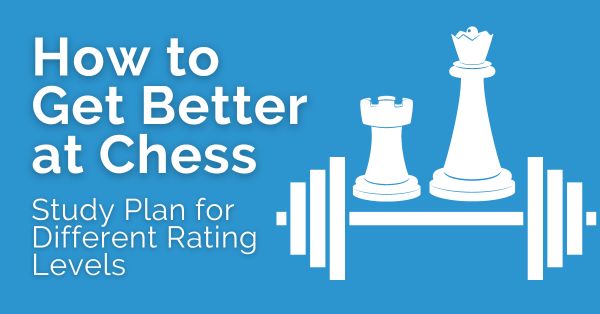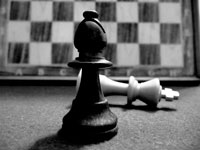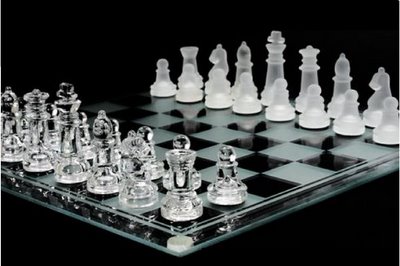How to Get Better at Chess: Study Plan for Different Rating Levels

A lot of people ask the same question over and over again, how to get better at chess? At the outset improving in chess is the same as improving any skill – Learn. Practice. Analyze. Repeat.
But there is a vast difference between what beginners need to ‘learn’ compared to Expert players. So how to know where to start?
First, knowing at what level you are playing now is important. It would depend on what to study and how to improve from the player’s current (estimated) rating — chess level by ELO.
This article gives an idea of what should players work on at different levels of their chess careers.
Chess Study Plan for 299 Elo
Learn basic rules of chess
The first step is to understand the basic rules of the game. You should look to master every rule so that you can focus on playing chess.
How chess pieces move
The most important characters in the game – the pieces. Each piece has its say on the board. Look to learn how each piece behaves and how they interact with each other. This forms the foundation for learning tactics.
Special rules of chess (en passant, castle, etc)
When learning the rules of the game, you will come across special rules. Every player must know these rules – when are they applicable and how to use them.
Here’s a sample daily chess study plan that you can use. You can modify it to your needs.
| Day | Study Topics | Duration |
| Monday | Learn Basic Rules of Chess + Piece Movement / Miscellaneous (YouTube Chess, Book Reading, Videos Courses) | 1 Hour |
| Tuesday | Play Games + Quick Analysis | 1 Hour |
| Wednesday | Learn Special Rules of the Game / Miscellaneous (YouTube Chess, Book Reading, video courses) | 1 Hour |
| Thursday | Play Games + Quick Analysis | 1 Hour |
| Friday | Play Games + Quick Analysis | 1 Hour |
| Saturday | Review all game lessons | 1 Hour |
| Sunday | Review all topics learned | 1 Hour |
Chess Study Plan for 300-1000 Elo
Elementary Checkmates
You should master the following elementary checkmates to the point where you can play like a GM if they arise on the board.
- King + Queen vs. King
- King + Two Rooks vs. King
- King + Rook vs. King
- King + Two Bishops vs. King
Learn Simple Attacks
Mastering simple attacking patterns will give you a lot of wins. Playing attacking chess gives you the initiative. You can look to play active moves at every turn you get.
Using simple attacks will lead to positions that will generate a lot of tactics and if you’re good at them then you can quickly score a win.
Learn Elementary Tactics
You should train the following tactical patterns daily:
- Pin
- Fork
- Double Attack
- Destroying the Defender
You will get a lot of chances to employ these tactics in your games. The Woodpecker method is a great way to gain a good grasp on these elementary tactics.
At this level, mastering these tactics is the quickest way to progress to the next level.
Here’s a sample daily chess study plan that you can use. You can modify it to your needs.
| Day | Study Topics | Duration |
| Monday | Learn elementary checkmates / Solve checkmate exercises | 1 Hour |
| Tuesday | Play Games + Quick Analysis | 1 Hour |
| Wednesday | Learn simple attacks / Solve basic attack exercises | 1 Hour |
| Thursday | Learn + Practice elementary Tactics | 1 Hour |
| Friday | Play Games + Quick Analysis | 1 Hour |
| Saturday | Review all game lessons | 1 Hour |
| Sunday | Review all topics learned / Miscellaneous (YouTube Chess, Book Reading, Videos Courses) | 1 Hour |
Chess Study Plan for 1000-1199 Elo
Learn basic opening ideas
Thoroughly learn Basic opening concepts like lead in development and Centralization. Just try to play logical moves in the opening stage of the game. Learning 5-6 moves of an opening of your choice should be enough.
Learn basic checkmates
You can learn basic checkmates from courses or books. There are a few dozen of these that you can quickly master. Practice them until you are completely confident and can checkmate anyone (even a GM) in these positions.
Practice Your Skills
Devote the majority of your time to playing games and looking over them. Don’t shy away from playing higher-rated players as you will learn a lot from these games.
Here’s a sample daily chess study plan that you can use. You can modify it to your needs.
| Day | Study Topics | Duration |
| Monday | Learn basic opening ideas / Review opening ideas | 1 Hour |
| Tuesday | Play Games + Quick Analysis | 1 Hour |
| Wednesday | Learn + Practice Basic Checkmates | 1 Hour |
| Thursday | Play Games + Quick Analysis | 1 Hour |
| Friday | Play Games + Quick Analysis | 1 Hour |
| Saturday | Review all game lessons | 1 Hour |
| Sunday | Review all topics learned / Miscellaneous (YouTube Chess, Book Reading, Videos Courses) | 1 Hour |
Chess Study Plan for 1200-1399 Elo
Learn Openings
Spend a maximum of 20% of your study time to study openings. Until 1800 level openings aren’t very important. Concentrate more on the middle game and tactics.
It is okay to learn systems-based openings (e.g. Colle system and London system) but make sure you know the plans and ideas in those openings.
It is best to experiment with all the openings to find which one suits you the best.
Study Middlegames
As you are a club player now middlegames gain much more importance. It’s important to be aware of strategic and positional factors during a game.
Learn these concepts from the best sources and try to apply them in your games.
- Space
- Material
- Pawn Structures (passed pawns, weak pawns, etc.)
- Bishop vs Knight
- King Safety
- Weak and Strong Squares
- Initiative
Study Intermediate Tactics
Building on the knowledge of elementary tactics you should learn to spot tactics 2-3 moves in advance. Also, it’s important to learn to calculate 5 ply (a ply is a half move; e.g. 1.e4 e5 is 2 ply) or greater tactical patterns.
The following patterns should feature regularly in your chess study
- Pin
- Fork
- Skewer
- Discovered Attack/ Check
- Deflection
- Decoy
- Attacking the King
- Destroying King Shelter
The best way to do this is to learn an intermediate tactics video course and then solve as many tactical puzzles as possible.
Here’s a sample daily chess study plan that you can use. You can modify it to your needs.
| Day | Study Topics | Duration |
| Monday | Learn or Revise Openings / Miscellaneous (YouTube Chess, Book Reading, Videos Courses) | 1 Hour |
| Tuesday | Play Games + Analysis | 1 Hour |
| Wednesday | Study Middlegames | 1 Hour |
| Thursday | Play Games + Analysis | 1 Hour |
| Friday | Play Games + Analysis / Miscellaneous (YouTube Chess, Book Reading, Videos Courses) | 1 Hour |
| Saturday | Review all game lessons | 1 Hour |
| Sunday | Learn + Solve Tactics | 1 Hour |
Chess Study Plan for 1400-1599 Elo
Focus on the Endgame
The endgame is the key at this level. Only imagine the advantage you get against your opponent if you know how to play endgame well and your opponent does not. The odds are that you will win the endgame almost immediately.
Study basic endgame schemes. Do these endgames repeatedly so that they become second nature to you.
- King + Pawn vs. King
- King + 2 Pawns vs. King
- King + Pawn vs. King + 2 Pawns, and so on
Work on Your Tactics and Calculation Skills
Besides the endgame, do tactics problems (puzzles). This will give you the best cost-to-benefit ratio. Learn basic Calculation methods: forcing moves, elimination method, etc, and try to apply them when you solve tactics.
At this stage, the focus should be on solving a puzzle fully rather than how quickly or how many puzzles you did.
Play Long Time control Practice Games
Long-time control games will further cement the basic calculation skills that you learn. When you have time to think about a position then you can use your conscious mind to implement new habits ( eg looking for forcing moves first in a tactical position, listing all candidate moves)
Play Rated Tournament Games
Play as much chess as possible, especially in real-life over-the-board (OTB) tournaments with long-time control.
It has been shown in research that doing an activity with stakes brings out the best in you and helps you to improve that skill quickly. It’s widely agreed upon that the best way to improve in chess is to play slow OTB Tournament games.
Here’s a sample daily chess study plan that you can use. You can modify it to your needs.
| Day | Study Topics | Duration |
| Monday | Tactics and Calculation | 1 Hour |
| Tuesday | Play Games + Analysis | 1.5 Hours |
| Wednesday | Learn + Practice Endgames / Opening Study | 1 Hour |
| Thursday | Play Games + Analysis | 1.5 Hours |
| Friday | Play Games + Analysis / Miscellaneous (YouTube Chess, Book Reading, Videos Courses) | 1.5 Hours |
| Saturday | Review all game lessons / Rated Tournament Games | 1 Hour |
| Sunday | Review all topics learned / Rated Tournament Games | 1 Hour |
Chess Study Plan for 1600-1799 Elo
If you got on this level, it means you are already a strong, very solid chess player who knows a lot about all stages of the game of chess. Keep working on your middle game, strategy, and tactics.
Advanced Middlegames
Keep playing games to acquire more experience in the middle game. You can make faster progress by focusing on two things:
- Learning new middlegame themes
- Learning all the middlegame strategies of your openings
Advanced Strategy
When you learn advanced middlegames you will also encounter advanced strategies. It is a good idea to take note of all these new strategies you see and keep coming back to them from time to time. At this level, you can also start learning about sacrifices and how positional sacrifices work.
Advanced Tactics
You will have a good grasp on basic one-two-move tactics. Try to build upon it and solve tactical combinations. If you’re unable to get the right answer, see why the tactical pattern/ combination worked (how the pieces interact with each other)
Doing the above daily should propel you to the next level.
Play Blindfold Chess
Blindfold chess helps to develop a player’s visualization ability and eliminates most blunders. All GMs can play blindfold chess well.
Try to play blindfold chess. It is easy these days since online chess websites offer nice options to play blindfold chess. You only see the chessboard with no pieces on it, but you can move these empty squares and play chess (because you know that knights are on b1 and c1, bishops are on c1 and g1, and so on).
During the game, you have to keep all the pieces in your head since they are invisible which is hard in the beginning. Play really weak players first.
Here’s a sample daily chess study plan that you can use. You can modify it to your needs.
| Day | Study Topics | Duration |
| Monday | Tactics and Calculation | 1 Hour |
| Tuesday | Play Games + Analysis | 1 Hour |
| Wednesday | Play Games + Analysis | 1 Hour |
| Thursday | Study Middlegames/Strategy Study | 1 Hour |
| Friday | Blindfold Chess / Miscellaneous (YouTube Chess, Book Reading, Videos Courses) | 1 Hour |
| Saturday | Review all game lessons | 1 Hour |
| Sunday | Review all topics learned | 1 Hour |
Chess Study Plan for 1800-1999 Elo
Systemize your opening repertoire
At this level, it’s not necessary to have a thorough move-by-move repertoire. Instead, focus on having a solid understanding of the first 10-15 moves of your opening. Ideally, you should know very well 2-3 openings for white and 2 for Black.
Give importance to moves and lines that you are more likely to face during a game. You can figure this out through experience or a database.
Analyze Your Games
The key to advancing to the expert level here is to analyze your games. After the game, sit down with a chessboard, paper, and pen and go over the game move by move writing down thoughts on your own and your opponent’s moves. Only then you check your game with an engine.
The number #1 mistake chess players make, is they either do not analyze their games at all or analyze them by using a chess program right away. This is a big mistake that slows down chess progress. The main idea of analysis is not to look at what the computer thinks was a good move, but to look for that move yourself.
Deep Study Grandmaster Games
It is a great idea to go over GM games and think them over. Grandmasters play chess at the highest level possible for a human. Looking at their games and understanding the thought process will bring immense benefits.
The best way to go over these high-level games is to first go over all the moves without the author’s comments and only second time read the comments and annotations. This works great with the openings too.
Work on in-game tactics and endgames
When you analyze your games, you will realize that tactics and endgame knowledge play a huge role. Note down whatever tactical pattern you missed or basic endgame misplayed. If you analyze many games, you see a pattern of where you go wrong repeatedly.
Work on these areas and you will see an immediate improvement in your game. This method of focusing on tactics and endgames is effective at this level.
Here’s a sample daily chess study plan that you can use. You can modify it to your needs.
| Day | Study Topics | Duration |
| Monday | Play Games + Analysis | 1 Hour |
| Tuesday | Study + Review Openings | 1 Hour |
| Wednesday | Tactics and Calculation | 1 Hour |
| Thursday | Play Games + Analysis | 1 Hour |
| Friday | Play Games + Analysis | 1 Hour |
| Saturday | Review all game lessons + Analyze Grandmaster Games | 1 Hour |
| Sunday | Review all topics learned / Practice Tactics or Endgames | 1 Hour |
Chess Study Plan for 2000-2199 Elo
Congratulations, you are now an Expert. Keep working on chess and I’m sure you’ll be able to make at least a Master sometime soon when you do, please, send me a message saying “Hi! I am a Master now!”
Expert-Level Opening Preparation
At this level, you should know the theory for the openings you play. Also, it is necessary to know the respective model games for each line in your opening repertoire. Players in the 2000 to 2199 Elo range slowly start a develop a unique style for themselves. Therefore, it is a good idea to play openings that align with your style.
Also, keep a lookout for the latest trends in your openings. This can be done with a quick daily scan of the latest Grandmaster games.
Play Opening Themed Practice Games
The opponents you encounter also know opening well and they tend to play the mainlines. So, in most of your games, you will reach standard positions of the opening. These positions are also called ‘Opening tabiyas’.
An extensive study of the standard plans and maneuvers of the opening tabiya will help you immensely.
Once you have learned this you can proceed to play Opening-themed practice games. Both players agree beforehand to reach a specific opening tabiya and then play a game from that position. You must play both sides of the position to get a solid understanding of the opening tabiya.
Your workflow can look like this. First, a quick search of the database for the following position will give you a list of GM games. Next, go through the games to understand all the plans and ideas. Now with the help of a sparring partner play games for both sides of the opening.
Expert-level endgame studies
After openings, the next aspect that you should focus on is Calculation. At this level, one of the most efficient ways to train calculation ability is to solve endgame studies. The goal of endgame studies is twofold:
- Improve Deep Calculation
- Learn new tactical/positional patterns
While solving studies it is important to remember that it is OK to not get the right solution. What’s important is that you give it your all, whether you think for 10 mins or 30 mins. Afterward, check the solution and see how your ideas match up to the solution.
Tip: As a player gains more experience, they tend to develop bad habits. They understand that since it is a study, the winning move must be ‘unnatural’ so they ignore all normal moves and try to find a quirky pattern/move that solves the position. Even if the player manages to get the right solution it ends up being counterproductive. You should look at normal lines as well and figure out why they don’t work.
Give a chess simul
You’re a strong player! Strong enough that you can give simultaneous display or simuls. Giving simuls pushes your abilities to the max and forces you to operate at your peak level. It improves mental strength and quick thinking.
Play practice blindfold games
We train the technical aspects of Calculation through endgame studies. It is equally important to improve visualization abilities. Even though the visualization abilities of 2000+ players are much better than class chess players, there is much scope for improvement.
To train this you can play blindfold games. The easiest way would be to pick up a book that has games with ample diagrams. Try to visualize without a physical board from move one and once you reach a diagram pause and see if your mind’s image matches the one in the diagram. If not, then memorize the diagram and then do the same for a further set of moves.
If you want to increase the difficulty level then you can solve easy to medium endgame studies without looking at the board.
Now, you are set to play blindfold games. Play as many games as possible to deeply ingrain the board in your mind’s eye.
Consider hiring a chess coach
What a person can achieve alone in 5 years, one can do the same in 1 year with a coach. Having a personal coach/mentor is a huge bonus for any chess player. The game is so technical and complex that at some point or other we all need guidance. Some players make do with an engine but a chess coach is irreplaceable.
If you want to progress further and become a master player then you should seriously consider hiring a chess coach.
Here’s a sample daily chess study plan that you can use. You can modify it to your needs.
| Day | Study Topics | Duration |
| Monday | Deep analysis of games | 2 Hours |
| Tuesday | Play Games + Analysis | 2 Hours |
| Wednesday | Session with Coach | 1 Hour |
| Thursday | Play Games + Analysis | 2 Hours |
| Friday | Endgame Studies | 1 Hour |
| Saturday | Review all game lessons + Analyze Grandmaster games | 2 Hours |
| Sunday | Opening Preparation | 1 Hour |
Frequently Asked Questions
How long it takes to get better at chess?
The time it takes to improve at chess varies widely based on factors such as dedication, learning methods, and natural talent. With consistent practice and study, you can see noticeable improvement within a few months to a year.
How can I improve my chess?
To improve your chess, it is important to have a dedicated study plan. This plan should focus on key improvement areas for your level.
Does chess improve your life?
Chess can improve cognitive skills like problem-solving and critical thinking. Playing in tournaments also provides you with a chance to interact with new people and network.
What will happen if you play chess every day?
Playing chess alone daily will strengthen your existing knowledge and skills. If you want to improve then alongside playing you should learn new concepts.
Does chess require a high IQ?
No, chess does not necessarily require a high IQ. The ability to reason and think logically is more important than IQ.
Can you get better at chess as an adult?
Yes, you can get better at chess as adults. The key is to follow a structured and focused study plan.
Ready to start winning games? Check out our store and articles:










Comments: